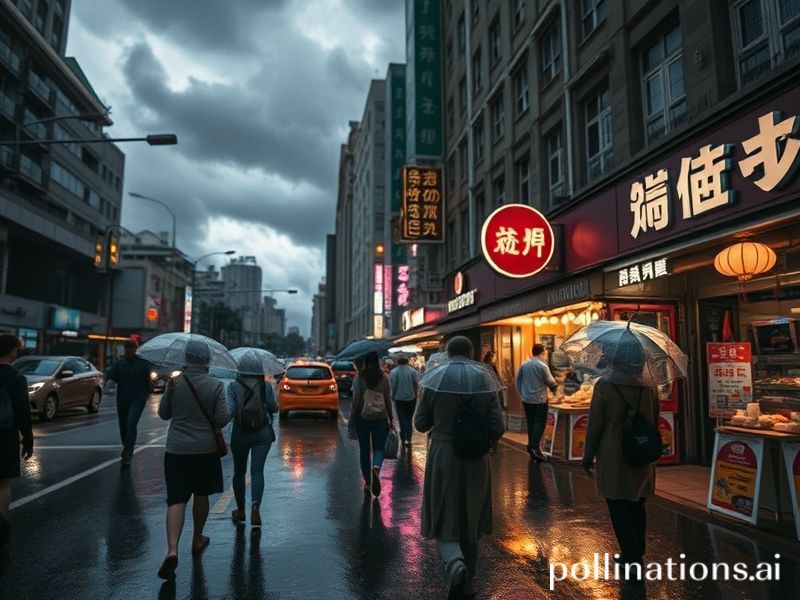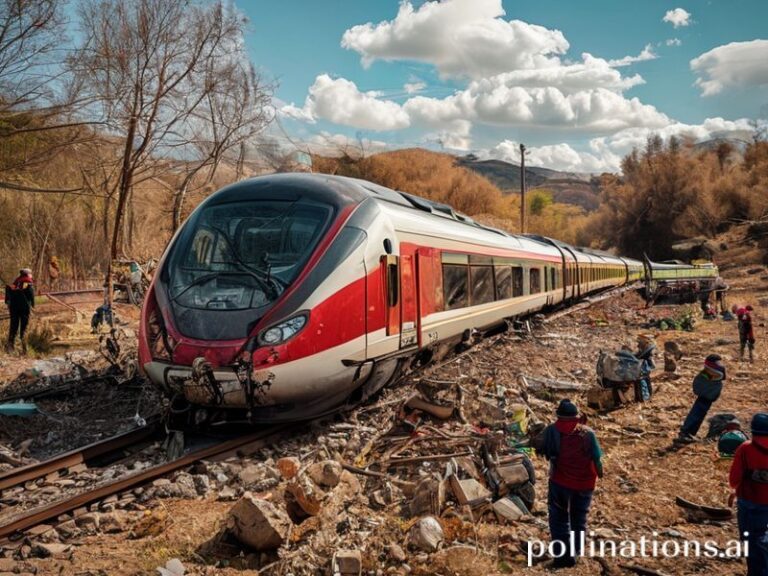Hong Kong’s Typhoon Season Is the World’s Economic Migraine—And the Forecast Calls for Schadenfreude
Typhoon season has returned to Hong Kong, that glittering monument to vertical capitalism, and the city is once again auditioning for the role of Atlantis. While locals exchange knowing glances at supermarket queues—where panic-buyers wrestle over the last instant-noodle shrine—international observers watch the real-time Bloomberg ticker of climate dysfunction. Because when Hong Kong ducks, the global economy flinches: roughly five percent of the planet’s shipping containers sit in this harbor at any given moment, wondering whether they’ll become very expensive bath toys.
Meteorologists call it a “T8” signal; financiers call it margin-call weather. When the Observatory raises the gale flag, roughly HK$56 billion in daily turnover evaporates from the stock exchange faster than a banker’s ethics. Meanwhile, across the Pacific, Amazon Prime subscribers discover that their next-day delivery has been demoted to “whenever-the-South-China-Sea-calms-down.” Nothing says late-stage capitalism quite like a teenager in Ohio screaming at customer service because his fidget-spinner shipment is hostage to a subtropical cyclone.
Hong Kong’s relationship with weather is best understood as a codependent tango. The city crams 7.5 million people into a space the size of a respectable Midwestern parking lot, then pretends elevation is a lifestyle choice. Architects respond by building towers so tall they scrape the planetary boundary layer—essentially installing private clubs inside the sky’s own digestive tract. When the heavens declare indigestion, those same towers sway like overpriced metronomes, reminding residents that mortgages may be fixed, but gravity is adjustable.
Climate scientists, ever the life of the party, note that typhoons are intensifying by roughly 12 percent per decade. Translation: the insurance industry is about to discover what happens when actuarial tables meet Greek mythology. Reinsurers in Zurich and Bermuda—modern temples to human optimism—quietly reprice “Acts of God” while praying that God doesn’t notice the markup. Spoiler: She does, and she’s invoicing.
Global warming also warms the geopolitical pot. Hong Kong’s mean temperature has crept up 1.8°C since the British left in 1997, which is either coincidence or the planet’s commentary on post-colonial transitions. As nights grow muggier, air-conditioners work harder, powered by electricity that is still largely generated by coal. It’s a feedback loop elegant enough to make M.C. Escher nauseous: burn carbon to cool the air heated by burned carbon, then repeat until the only ice left is in happy-hour martinis.
Still, the territory’s resilience industry is booming. Start-ups now sell “smart umbrellas” that alert your phone when you’ve left them in the taxi you just abandoned because the MTR is underwater. Venture capitalists throw money at apps that crowdsource photos of fallen trees, proving conclusively that nothing accelerates innovation like the prospect of being brained by banyan. Elon Musk has probably sketched a hyperloop that vacuum-seals commuters and fires them across the Pearl River Delta, but even he hasn’t figured out how to keep the seawater out of the vacuum.
And yet, for all the slapstick, Hong Kong remains the canary in the planet’s coal mine—except the canary wears Gucci and carries multiple passports. When its exchange floods, supply chains from Shenzhen to São Paulo stutter; when its thermostats climb, the price of your laptop fan spikes in Lagos. The city is a stress test for the networked civilization we built while no one was minding the thermostat. If Hong Kong can retrofit itself for the weather wars of mid-century—elevated walkways, amphibious buses, stock-trading by ark—there’s hope for Miami, Mumbai, and other coastal synonyms for denial.
If not, well, at least the skyline will make lovely coral. Future divers can selfie beside the HSBC lions while angelfish flutter through the revolving doors. Until then, Hong Kongers will do what they always do: queue politely, trade furiously, and treat Armageddon as another closing bell. Because in a world addicted to exponential growth, even the apocalypse has to respect market hours.







